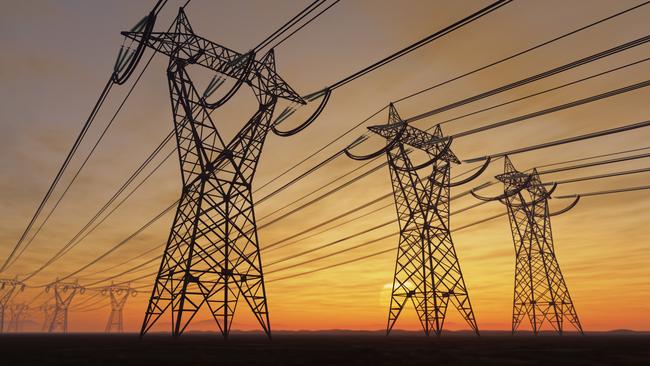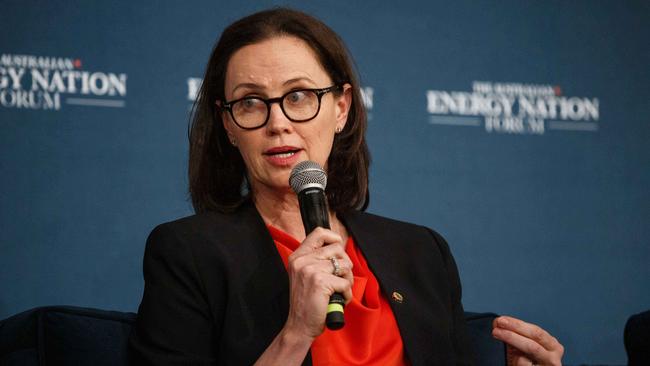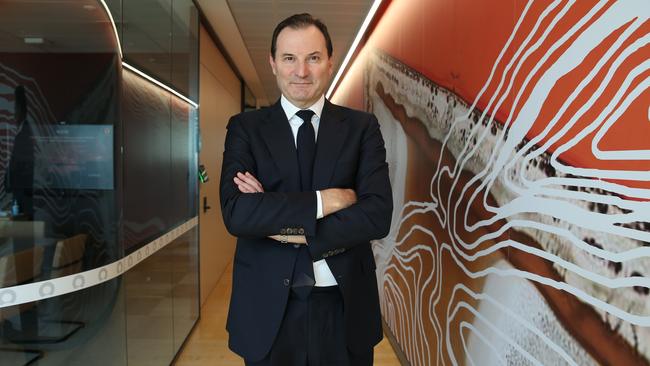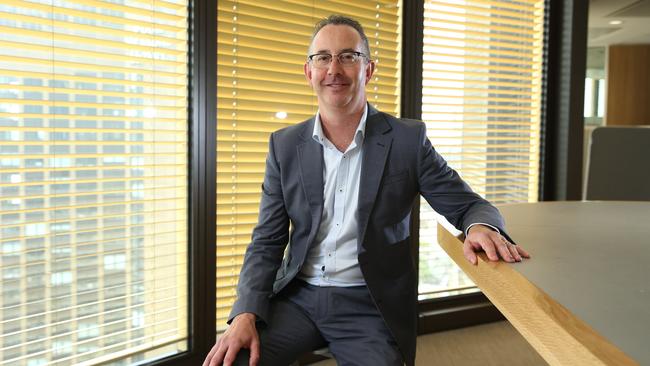Energy bosses call for market certainty as nation switches to renewables
Australia’s energy chiefs, and their biggest customers, are calling for policy certainty from government to ensure a more efficient and prosperous transition to renewable power.

Business
Don't miss out on the headlines from Business. Followed categories will be added to My News.
The nation’s most powerful energy bosses, and their biggest customers, are calling for policy certainty across all levels of government in the year ahead to ensure a more efficient and prosperous transition to renewable energy.
Ahead of a federal election, the leading executives pointed to the crucial need for clarity and uniformity as they restructure and reform their own businesses to deal with the move to renewables and carbon emission targets.
“In our shared pursuit of a net zero economy by 2050, we need to ensure that we don’t pull down the energy system of today faster than we can build the energy system of tomorrow,” Shell Australia chair Cecile Wake said.
In response to The Australian’s CEO Survey 2025, the leading executives warned they were seeing investors “pull investment from Australia” into countries with more “stable and supportive policies”. And they said government should not be “picking winners or indeed ruling out energy vectors and solutions on the basis of ideology”.

Ms Wake said access to reliable, secure and affordable energy was fundamental to productivity, growth and national prosperity.
“And, of course, that energy must be increasingly lower carbon and increasingly electrified,” Ms Wake told The Australian.
“If we get this right, we set up Australia for a prosperous, competitive and sustainable future.”
Ms Wake, whose Shell operations in Australia have a portfolio that includes zero and low-carbon energy businesses, is looking for a harmonised, whole-of-government approach to energy security and the energy transition that is focused on delivering the lowest-cost, most reliable energy that meets emissions reduction targets.
“Government should not be picking winners or indeed ruling out energy vectors and solutions on the basis of ideology, because we will need every option available to reach net zero,” she said.
She said Australia had “tremendous potential to thrive in the journey to net zero” and that, today more than ever, energy security equated to national security. “Energy is Australia’s competitive advantage,” she said.
“But to fully realise that potential, we need a harmonised and stable regulatory framework across all levels of government that facilitates successful investment while delivering strong environmental protections and tangible benefits for communities.”
CEO SURVEY 2025: FULL COVERAGE
Origin Energy CEO Frank Calabria said delivering on Australia’s energy transition, while ensuring reliable, secure and affordable energy supply, would require Australia to look carefully at the design of the National Electricity Market.
“Energy is fundamentally important to our economic and social wellbeing and decarbonisation of the industry is critical to lowering emissions,” Mr Calabria said.
AGL chief executive Damien Nicks added: “This transition is a huge undertaking and opportunity and will require significant investment from companies like AGL to maintain fleet, for new build and to increase the flexibility of our portfolio to help manage some of the changing peaks and troughs in the energy market.”
Mr Nicks said Origin was reinvesting into Australia’s energy transition. “We have made significant investment commitments over the past 18 months, including a final investment decision on the Liddell battery, the purchase of Terrain Solar and Firm Power and investments in our retail transformation program to support our customers also sharing in the transition opportunity.”

Mr Nicks said it was critical for AGL – which operates the nation’s largest electricity generation portfolio within the National Electricity Market – to provide reliable, secure, affordable energy to its 4.5 million customers while supporting the most vulnerable and deploying $8bn-$10bn of capital to fund its ambition of adding 12GW of additional capacity by the end of 2035.
“We also need to ensure our existing assets can respond to the big changes we’re seeing in the energy market, such as the high uptake of roof top solar.”
Ampol CEO Matt Halliday said competitive energy and labour were critical foundations that flowed through almost every part of the economy and that, to strengthen Australia’s global competitiveness, it was essential to ensure there was a labour market that was flexible, innovative and could deliver the skills in areas where Australia had advantages.
“It is equally important that we can deliver competitive energy across the economy, and both these elements will be instrumental in driving sustainable productivity growth and ensuring Australia’s success in global markets,” Mr Halliday said.
APA CEO Adam Watson also called out regulatory and policy certainty as a critical issue, particularly in the energy sector and for investors whose capital would be required to fund reforms and the move to renewable energy.
“Investors have been telling me directly that they are pulling investment from Australia and instead choosing to invest their capital elsewhere – in places that have a more stable and supportive policy environment,” Mr Watson said.
“The second opportunity is to focus on removing the barriers to project delivery to allow the private sector to get on with delivering projects that can create jobs and drive economic growth. An example is unlocking new domestic gas in the Beetaloo. We know this is a critical nation-building project that can provide the gas consumers and business need. Local, state and federal governments need to work together to streamline approval processes to get this project to market.”

Incitec Pivot chief executive Mauro Neves hit out at the lack of certainty of gas supplies, warning that it could threaten the long-term viability of the nation’s manufacturing.
“Australia has some of the most abundant natural gas reserves in the world, yet we have a manufacturing sector that does not have certainty of supply,” Mr Neves said.
The biggest concern of his company, which makes chemicals for the agricultural industry and explosives for the mining industry, was securing “long-term economic gas supply” for its operations.
“Lack of certainty around gas supply inhibits our ability to make long-term investment decisions that could significantly boost productivity,” he said.
“Our shareholders rightly expect us to take a global view on investment, and if we have more certainty in other countries, that’s where the money is more likely to go.”
Mr Neves’ comments come as his company is reviewing the future of its ammonium phosphate manufacturing plant at Phosphate Hill in northwest Queensland.
Gas was an essential feedstock in the creation of ammonia, which was needed to make fertilisers and agricultural chemicals.
Policy certainty around energy was also cited as a key challenge facing chemicals and explosives manufacturer Orica by its chief executive, Sanjeev Gandhi.
Mr Gandhi told the CEO Survey the “unreasonable cost” of natural gas and high electricity prices were significant challenges facing the manufacturing industry. He said the industry needed certainty over energy prices, which were pressuring the industry at a time of rising labour costs.
“Australian manufacturing continues to face a number of challenges, including the unreasonable cost of local natural gas, electricity prices, cost of decarbonisation, carbon tax, rising labour costs and declining productivity,” he said.
“We require policy certainty across energy prices, industrial relations and ongoing support for future facing commodities to ensure the energy transition.”
Mark Ellenor, chief executive of Brickworks, the nation’s largest brick manufacturer, said affordable gas supplies were essential for the manufacturing industry, and it was important for governments to act effectively in supporting the development of new domestic gas supplies dedicated for domestic users to prevent gas crises.
“The retirement of fossil fuel generators requires careful planning and co-ordination of new generation capacity to provide consumers with reliable, secure, and affordable electricity,” Mr Ellenor said. “Energy market bodies should consider all available options for ensuring new generation is fit for purpose to meet consumer demand, provided at the lowest total system cost.”
More Coverage
Originally published as Energy bosses call for market certainty as nation switches to renewables
Read related topics:Climate Change




